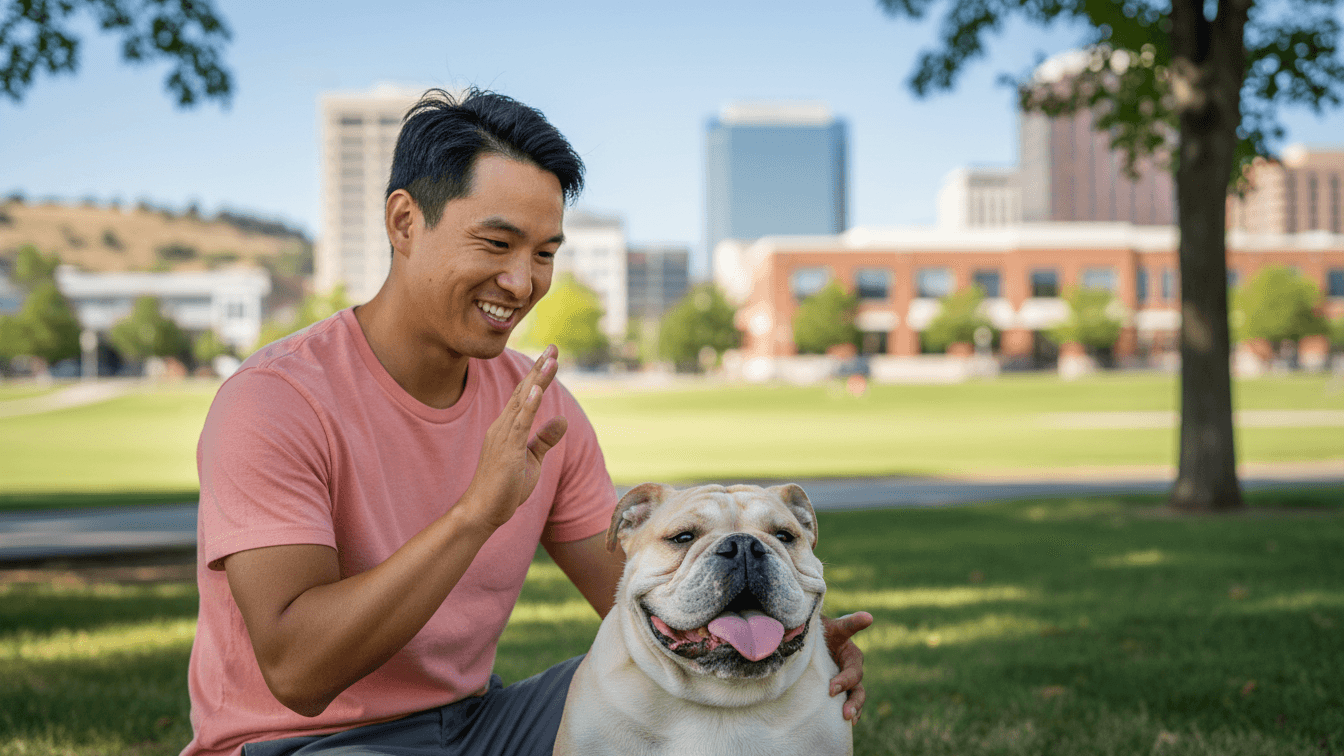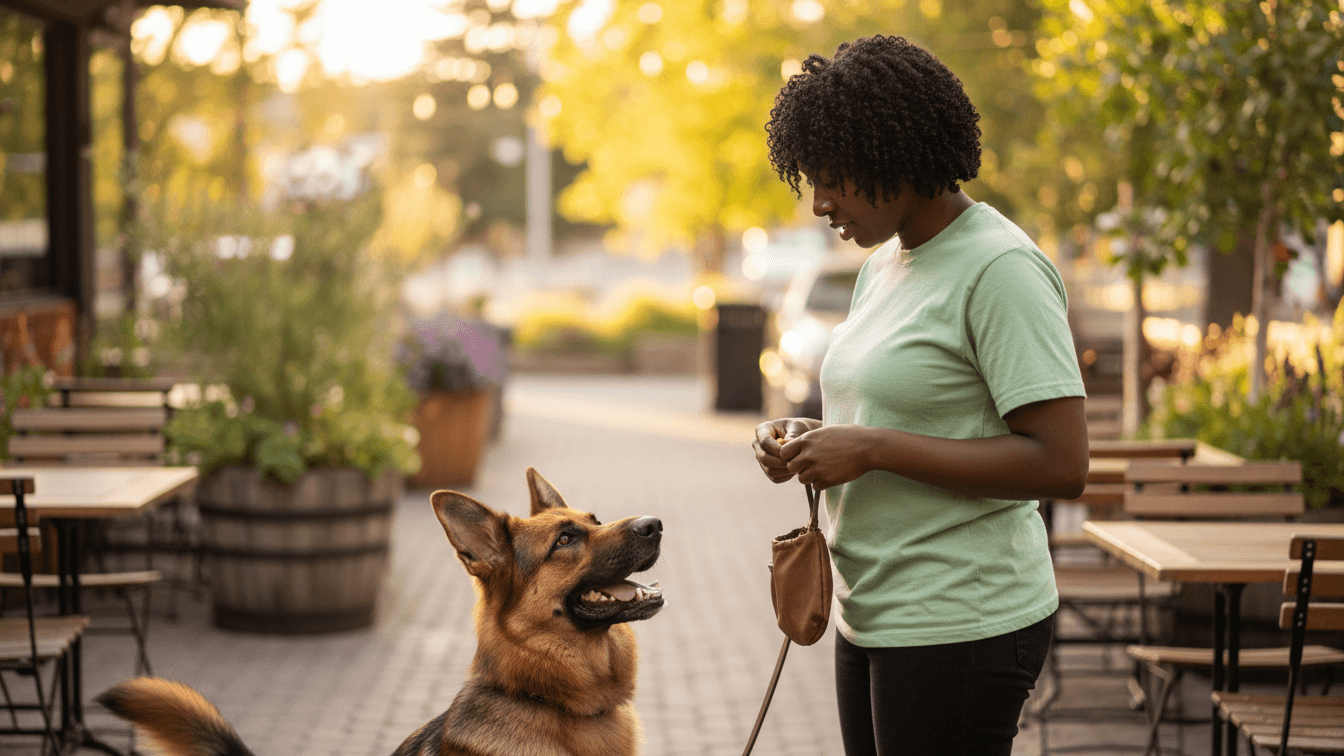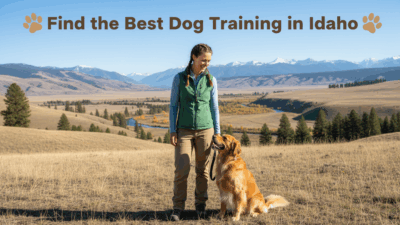Your Complete Guide to Choosing a Dog Trainer in Idaho
Living with a dog in Idaho means navigating wide-open spaces, mountain trails, and small-town communities where your dog needs to behave well around livestock, wildlife, and outdoor enthusiasts. Whether you’re in Boise walking the Greenbelt, hiking near Coeur d’Alene, or living in a smaller town like Twin Falls or Idaho Falls, your dog needs solid training to handle everything from farmer’s markets to off-leash trail encounters.
Idaho’s mix of urban areas and rural landscapes creates unique training challenges. Your dog might need to ignore deer on morning walks, stay calm around horses at local events, or practice reliable recalls in areas where leash laws vary by city. Finding a professional dog trainer who understands these Idaho-specific situations will make a real difference in your daily life.
How to Choose the Right Trainer
Start by looking for someone who uses positive reinforcement training and understands Idaho’s outdoor lifestyle. Your dog should learn to walk politely past other dogs on busy urban trails, stay focused when wildlife appears, and handle both crowded downtown areas and quiet rural settings.
Credentials help you compare trainers quickly and give you confidence in their education. Common dog trainer certifications include CPDT-KA, KPA-CTP, or IAABC-CDBC for behavior problems. If your dog has serious aggression or reactivity issues, look for someone with CBCC-KA credentials or a science-based program like CTC.
In-home dog training works great for puppy manners, door greetings, and neighborhood leash skills. Group classes make sense once your dog can focus around other dogs, which helps prepare them for Idaho’s busy dog parks and community events.
Ask about the trainer’s experience with Idaho-specific challenges like livestock distractions, wildlife encounters, and long off-leash hikes. A certified dog trainer who lives and works in Idaho will understand these situations better than someone following a generic curriculum.
Common Dog Training Methods Explained

Reward-based methods build trust while creating lasting behavior changes. They also help you follow local leash laws and keep your dog safe around the livestock and wildlife common throughout Idaho.
Basic obedience covers sit, down, stay, place, recall, and leash training so your dog can handle downtown walks, outdoor patios, and trailhead parking lots without pulling or jumping on strangers.
Puppy training focuses on socialization, potty training, bite control, crate comfort, and early leash manners. Starting with short, positive training sessions prevents bad habits from forming and prepares your puppy for Idaho’s active lifestyle.
Behavior modification addresses fear, reactivity, resource guarding, or separation anxiety through careful desensitization and counterconditioning. For serious cases, ask if your trainer works with local veterinarians who understand behavior issues.
Private lessons let you customize everything around your daily routines and specific goals. Day training can speed up results when you’re short on time or need intensive help with problem behaviors.
Dog training classes help your dog practice good manners around other dogs and people. The best group classes give dogs plenty of space, screen participants carefully, and teach calm behavior rather than just excitement.
Specialized training like service dog training or therapy dog training requires extra structure, public-access skills, and a very clear step-by-step training program.
Stay away from trainers who use fear, intimidation, or pain to get results. Humane methods are safer for everyone, easier to maintain long-term, and better for building a well-behaved dog you can trust in any situation.
Average Cost of Dog Training in Idaho (Updated for 2025)
Prices across Idaho depend on the trainer’s experience, location, and whether they serve urban areas like Boise and Meridian or more rural communities. Here’s what most Idaho dog owners are paying in 2025.
| Service Type | Average Cost (Idaho) |
|---|---|
| Puppy classes (4-6 weeks) | $140-$260 total |
| Group obedience classes (4-6 weeks) | $150-$280 total |
| Private lessons (60-90 min) | $100-$175 per session |
| In-home coaching packages (4-6 visits) | $400-$850 total |
| Day training (trainer works your dog) | $400-$900 per week |
| Behavior consult for reactivity/anxiety (initial) | $140-$240 |
| Board and train (2-4 weeks) | $1,800-$4,200 total |
You’ll probably pay extra travel fees if you live in a rural area or smaller town, and expect higher rates for complex behavior work or aggressive dog training.
Make sure you understand what’s included in the price, how the trainer tracks progress, and whether they offer a free consultation or free evaluation before you commit to a training program.
Questions to Ask a Potential Dog Trainer
- What training methods do you use, and how do you keep sessions positive and low-stress?
- What credentials do you have, like CPDT-KA or KPA-CTP? Do you keep up with continuing education such as CPDT-KSA?
- How will you customize the training plan for my dog’s specific needs and our Idaho lifestyle?
- Do you offer in-home visits, dog training classes, or day training, and which approach fits my goals best?
- How will we measure my dog’s progress and know when to add more distractions?
- What are the total costs, including any travel fees, and what’s your cancellation policy?
- Do you carry liability insurance, and can you show me proof?
- For behavior problems, will you work with my veterinarian if needed?
- What should I practice between training sessions to help my dog keep improving?
- Have you worked with dogs who need to handle wildlife distractions or livestock encounters?
Idaho Considerations for Dog Owners
Idaho state law doesn’t regulate dog trainers specifically, so anyone can call themselves a professional dog trainer regardless of education or experience. This makes checking credentials and asking about training methods even more important.
Idaho doesn’t require statewide dog licenses, but many cities and counties have their own licensing requirements. Check with your local city clerk or animal control office to find out what applies to your area.
Rabies vaccination is required throughout Idaho for all dogs over four months old. Your veterinarian will provide a rabies tag that should stay on your dog’s collar at all times.
Leash laws vary significantly across Idaho. Most cities require dogs to be leashed in public spaces, but some rural areas have different rules. Boise requires leashes in all city parks except designated off-leash areas. Coeur d’Alene, Idaho Falls, Twin Falls, and Pocatello have similar requirements. Always check local ordinances before assuming your dog can be off-leash.
Many Idaho communities have leash laws that include voice control provisions, meaning your dog must respond reliably to commands even when off-leash. This makes recall training absolutely essential if you want to enjoy Idaho’s many hiking trails and open spaces legally and safely.
Barking ordinances exist in most Idaho cities to prevent nuisance complaints. Work with your trainer on alert barking and separation anxiety before neighbors start calling animal control.
If you live near agricultural areas, be aware that Idaho's livestock protection laws allow ranchers and farmers to protect their animals from threatening dogs. Training a solid recall and teaching your dog to ignore livestock isn’t just good manners, it could save your dog’s life.
Expert dog trainers who offer dog training services in public parks may need permits and liability insurance depending on local regulations. This shows they’re running a legitimate business and taking their responsibilities seriously.
Local Idaho Resources for Dog Owners
These spots give you great places to practice polite manners, work on recalls, and provide safe enrichment for your dog. Always follow posted rules and etiquette guidelines.
- Ann Morrison Park Off-Leash Area in Boise offers fenced space where your dog can practice socialization and recalls safely. The Boise Parks and Recreation website has current rules and hours.
- Military Reserve Off-Leash Area in Boise provides hilly terrain perfect for building your dog’s confidence and practicing focus around other dogs.
- Tubbs Hill in Coeur d’Alene allows leashed dogs on trails with stunning lake views, giving you excellent opportunities to work on leash training around wildlife and other hikers.
- Julius M. Kleiner Memorial Park Dog Park in Meridian has separate areas for large and small dogs, making it easier to practice basic obedience without overwhelming your puppy.
- McCowin Park Dog Park in Twin Falls offers fenced areas where you can work on off-leash manners and recalls during quieter times of day.

FAQs
How much does in-home dog training cost?
Most Idaho trainers charge $100-$175 per in-home visit, with discounts available when you buy packages. Behavior problems typically start at the higher end of that range, and you may pay extra travel fees in rural areas.
Is in-home dog training worth it?
Absolutely, because you’re working on problems exactly where they happen. Your trainer can fix door manners, jumping on guests, counter-surfing, and yard reactivity right at home, then step outside to practice leash skills on your actual neighborhood streets.
Can you pay someone to house train your dog?
Yes, many trainers offer puppy classes and programs that include potty training, crate routines, and daily schedules. Day training can speed up the process while teaching you how to maintain the progress at home.
What is the 3-3-3 rule for dog training?
This is a helpful timeline for new or adopted dogs: expect about 3 days for your dog to decompress, 3 weeks to learn your routines, and 3 months to feel completely settled. Good training for dogs works with this natural adjustment period rather than fighting against it.
How long will it take to reach my training goals?
Most puppies and friendly adult dogs show solid progress within 4-8 weeks if you practice daily. Fear, reactivity, or separation anxiety typically requires several months of careful behavior modification with gradual increases in difficulty.
What should I bring to group classes?
Pack a flat collar or harness, a 6-foot leash, high-value treats, water, and current vaccination records if your trainer requests them. Leave retractable leashes at home for safety reasons.
What’s the leash law in Idaho?
Leash laws vary by city and county throughout Idaho. Most urban areas require dogs to be leashed in public spaces except inside designated off-leash dog parks. Check with your local animal control office for specific rules in your area.
Do I need a dog license in Idaho?
Idaho doesn’t require statewide dog licenses, but many cities and counties have their own licensing requirements. Contact your local city clerk or animal control office to find out what applies where you live.
What shots does my dog need in Idaho?
Rabies vaccination is required by Idaho state law for all dogs over four months old. Your veterinarian may also recommend distemper-parvo and bordetella based on your dog’s lifestyle and exposure to other dogs.
Are dog trainers required to be licensed in Idaho?
No special licenses exist for dog trainers in Idaho. Trainers follow normal business regulations, but there’s no state oversight of training methods or qualifications. This makes checking for credentials and asking about methods even more important when choosing a trainer to help your dog.
Where can I practice off-leash recall?
Use fenced dog parks in your area to keep things safe and legal while building your dog’s recall skills. Ann Morrison Park and Military Reserve in Boise, Julius M. Kleiner Memorial Park in Meridian, and McCowin Park in Twin Falls all offer fenced areas perfect for practice.
Which dog parks allow training around Idaho?
Most Idaho dog parks allow training as long as you’re not disrupting other dogs or running a commercial business without permits. Visit during quieter morning hours when you’re starting out with a new puppy or working on reactivity issues.
What beaches or trails allow dogs for training?
Lucky Peak State Park allows leashed dogs in most areas, providing excellent opportunities to practice focus around swimmers and boaters. Tubbs Hill in Coeur d’Alene welcomes leashed dogs on scenic trails perfect for building reliable obedience training around distractions. Many Bureau of Land Management and Forest Service lands throughout Idaho allow dogs, but always check local regulations before heading out.
What if my dog has issues with livestock or wildlife?
Many Idaho dog owners need help teaching their dogs to ignore deer, elk, cattle, horses, and other animals. Look for a trainer experienced with these specific distractions who can create a behavior modification plan that keeps your dog safe and legal around livestock.
Can I train my dog to be off-leash on hiking trails?
Many Idaho trails allow off-leash dogs, but your dog needs a bulletproof recall before you try it. Work with a trainer on distance recalls, emergency stops, and ignoring wildlife before attempting off-leash hiking. Remember that some areas require leashes year-round to protect wildlife, especially during nesting and calving seasons.
The right combination of thoughtful planning, humane methods, and consistent practice will help your dog become a confident companion ready to handle everything Idaho throws at them. Whether you’re navigating busy Boise neighborhoods or exploring remote mountain trails, a well-trained dog makes every adventure better and safer for everyone involved.
